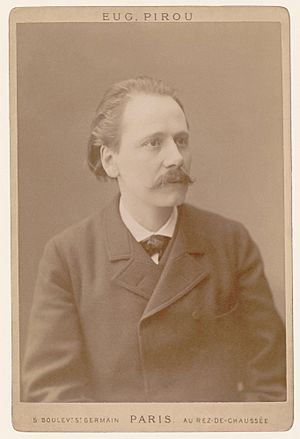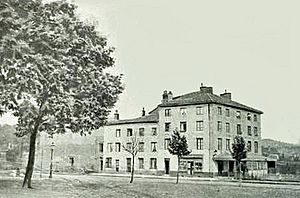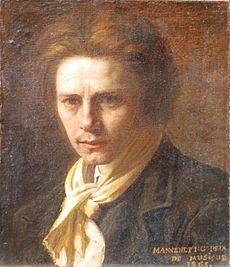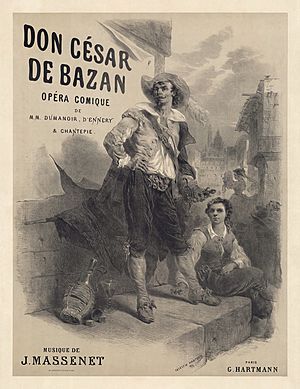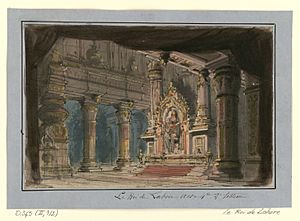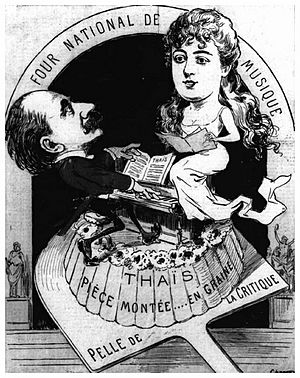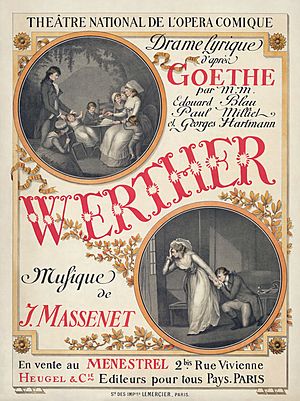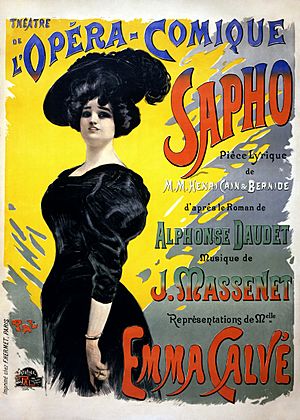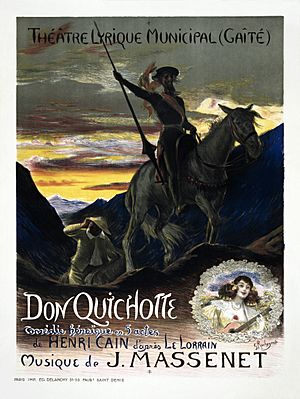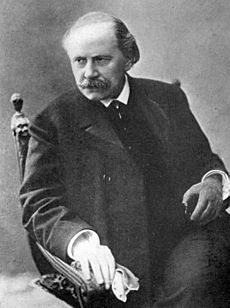Jules Massenet facts for kids
Jules Émile Frédéric Massenet (born May 12, 1842 – died August 13, 1912) was a famous French composer from the Romantic era. He is best known for his many operas, writing over thirty of them! His two most popular operas, which are still performed often today, are Manon (from 1884) and Werther (from 1892). Besides operas, Massenet also wrote oratorios (like musical plays about religious stories), ballets, orchestral music, piano pieces, and songs.
When he was still a schoolboy, Massenet was accepted into France's top music school, the Paris Conservatoire. He studied there with Ambroise Thomas, whom he admired greatly. In 1863, he won the Prix de Rome, a very important music prize in France. After this, he wrote a lot of music in many different styles. He quickly became famous for his operas. Over 45 years, he created more than forty stage works, including romantic comedies, serious dramas, and ballets. Massenet had a great understanding of what audiences in Paris would enjoy. He became the leading opera composer in France during the late 1800s and early 1900s.
Like many famous French composers, Massenet also taught music. He was a professor of composition at the Conservatoire from 1878 to 1896. Some of his students became well-known composers themselves, like Gustave Charpentier and Ernest Chausson.
After his death, some critics thought Massenet's music was old-fashioned. However, his two most famous operas, Manon and Werther, stayed popular. Later, in the mid-1900s, people started to appreciate his works more. Many of his operas are now performed and recorded again. While he might not be ranked with the very top opera geniuses like Mozart or Verdi, his operas are seen as well-made and smart pieces from the Belle Époque (a beautiful period in French history).
Contents
Biography
Early Life and Education
Jules Massenet was born on May 12, 1842, in Montaud, a small village that is now part of Saint-Étienne, France. He was the youngest of four children. His father, Alexis Massenet, was a successful ironmonger. His mother, Eléonore-Adelaïde, was a talented musician who gave Jules his first piano lessons.
In 1848, his family moved to Paris. Massenet attended the Lycée Saint-Louis and, from 1851 or 1853, the Paris Conservatoire. He was a very young student when he joined the Conservatoire.
At the Conservatoire, Massenet studied piano and music theory. In 1855, his family moved to Chambéry because his father was ill. However, Jules returned to Paris and the Conservatoire in October 1855. He continued his studies and, by 1859, won the top prize for pianists at the Conservatoire.
To support himself, Massenet gave piano lessons and played percussion in theater orchestras. This work helped him learn a lot about operas by composers like Gounod. He also met Wagner, who became one of his musical heroes.
In 1861, Massenet's first music was published: a piano piece called Grande Fantasie de Concert. He then joined the composition class taught by Ambroise Thomas. In 1863, he entered the Prix de Rome competition. This prize was very important and had been won by famous composers like Berlioz and Bizet. Massenet won the prize, which gave him three years of study, mostly at the French Academy in Rome.
While in Rome, Massenet studied the works of great German composers like Handel and Bach. He also met Franz Liszt. Massenet gave piano lessons to Louise-Constance "Ninon" de Gressy, a student of Liszt's. Massenet and Ninon fell in love and later married in October 1866. Their only child, Juliette, was born in 1868.
Early Career and Successes
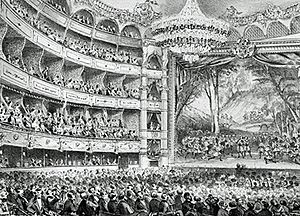
After returning to Paris in 1866, Massenet earned a living by teaching piano and publishing songs and piano pieces. The Opéra-Comique in Paris asked him to write a one-act comic opera, La grand'tante, which was performed in April 1867. In 1868, he met Georges Hartmann, who became his publisher and helped promote his music.
Massenet's music career was briefly stopped by the Franco-Prussian War of 1870–71. He served as a volunteer in the National Guard with his friend Bizet. The war was so terrible that he refused to write about it in his memoirs. His family was caught in the siege of Paris but managed to leave before the Paris Commune began.
After the war, Massenet returned to Paris. He finished his first large opera, Don César de Bazan (1872), but it was not a success. However, in 1873, he had success with his music for the play Les Érinnyes and with his oratorio Marie-Magdeleine. His reputation as a composer grew, but he still earned most of his money from teaching.
Massenet was a very productive composer. He would wake up early and compose from four in the morning until midday, a habit he kept his whole life. He usually worked quickly and didn't change his music much. His opera Le roi de Lahore, which was a grand opera, took him several years to complete. It was finished in 1877 and was one of the first new works performed at the Palais Garnier, a famous opera house. This opera was a big success and was performed in many cities around the world.
This time was a high point in Massenet's career. He received the Legion of Honour award in 1876. In 1878, he became a professor at the Conservatoire and was elected to the Institut de France, a great honor for someone in his thirties.
Massenet was a popular and respected teacher. He encouraged his students to develop their own ideas. Many people believe his influence helped French musicians write more freely.
Major Operatic Works (1879–1896)
Massenet's growing fame didn't stop some challenges. In 1879, the director of the Paris Opéra refused to stage his new opera, Hérodiade, thinking its story was not suitable. However, the opera house in Brussels immediately offered to perform it. Hérodiade premiered in Brussels in December 1881 and was a big hit. It finally came to Paris in February 1884. By then, Massenet was known as the top French opera composer of his time.
Manon, which first played at the Opéra-Comique in January 1884, was a huge success. It was then performed in major opera houses across Europe and the United States. Manon became, and still is, one of the most important French operas, alongside Gounod's Faust and Bizet's Carmen.
After Manon, Massenet wrote another grand opera, Le Cid, in 1885. This marked his return to the Paris Opéra. A newspaper in New York wrote that with Le Cid, Massenet showed himself to be a composer of clear and inspiring melodies.
After these two triumphs, Massenet had some ups and downs. He worked on Werther for several years, but the Opéra-Comique thought it was too sad. In 1887, he met the American soprano Sibyl Sanderson. He wrote Esclarmonde (1889) for her, which was a success. However, his next opera, Le mage (1891), was not.
Massenet regained his successful form in 1892. Werther had its first performance in February 1892 in Vienna. Some people consider Werther to be Massenet's best work, but it wasn't an immediate hit everywhere. It was performed in Paris in 1893, and also in the United States, Italy, and Britain, but the reaction was quiet. It wasn't until a new production in 1903 that Werther became a popular favorite.
Thaïs (1894), also written for Sanderson, was moderately received. Like Werther, it became more popular after its first revival, four years later. In the same year, he had a small success in Paris with the one-act opera Le portrait de Manon and a much bigger one in London with La Navarraise. The Times newspaper noted that in La Navarraise, Massenet used a realistic style similar to other popular operas of the time.
Later Years and Legacy (1896–1912)
In 1896, Ambroise Thomas, the director of the Conservatoire, died. Massenet was offered the position but refused it. He then resigned as a professor of composition. He wanted to focus entirely on composing. Gabriel Fauré took over his teaching position.
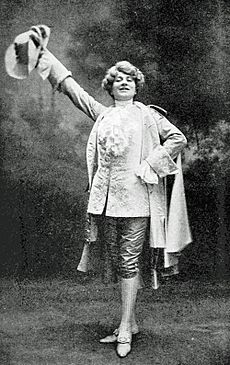
Massenet continued to compose. His operas Sapho (1897) and Cendrillon (1899), his version of the Cinderella story, were both well-received.
At the start of the 1900s, Massenet's operas were performed every season at the major opera houses in Paris and around the world. He lived a life of steady work and success. He preferred to stay at home in Paris or his country house, avoiding the spotlight. He called himself "a fireside man, a bourgeois artist."
In 1903, Massenet composed his only piano concerto, but it didn't make a big impression compared to his operas. In 1905, he wrote Chérubin, a light comedy about the character Cherubino from Mozart's The Marriage of Figaro. He also wrote two serious operas, Ariane and Thérèse. His last major success was Don Quichotte (1910). Even as his health declined, he wrote four more operas: Bacchus, Roma, Panurge, and Cléopâtre. The last two, like Amadis (which he couldn't finish earlier), were performed after his death and are not well-known today.
Jules Massenet died on August 13, 1912, in Paris, at the age of seventy. He had been suffering from abdominal cancer. His family was with him when he passed away. As he wished, his funeral was private, with no music, and he was buried in the churchyard at Égreville.
Music
Massenet's Style
Massenet's music was influenced by composers like Gounod, Thomas, and even Wagner. However, Massenet didn't fully adopt Wagner's style. He took from Wagner a rich way of using the orchestra and a smooth way of developing musical themes.
While Massenet could write loud and dramatic scenes, much of his music is soft and delicate. Critics have sometimes focused on this, but his best operas balance this gentle side with strong drama, exciting stage action, or humor.
Massenet's audiences in Paris loved exotic music, and he often included musical sounds that brought to mind faraway places or ancient times. His operas feature settings from ancient Egypt, mythical Greece, biblical Galilee, Renaissance Spain, India, and Revolutionary Paris. He was skilled at using the orchestra to create these effects. He also understood singers' voices very well and wrote music that suited them perfectly.
Operas
Massenet wrote over thirty operas. Some of his early works are lost, and others were changed significantly after their first performances. This means the exact number can vary depending on how they are counted.
Massenet's style remained quite consistent throughout his career. He also worked with many different writers for his opera stories. He wrote many different types of operas, from light comic operas like Manon to grand operas like Le roi de Lahore. His operas can have anywhere from one to five acts. He used many different descriptions for his works, such as "sung comedy," "lyric comedy," or "tragic opera."
In some operas, like Esclarmonde, Massenet moved away from traditional separate songs (arias) and duets. Instead, the singing flows more continuously, blending spoken-like parts with more melodic sections. This was sometimes compared to Wagner's style.
Massenet enjoyed adding comedy to his serious works and also wrote some mainly comic operas. Cendrillon and Don Quichotte are considered successful comic operas.
Today, Massenet is the fourth most popular French opera composer, after Bizet, Offenbach, and Gounod. His most performed operas are Werther, Manon, Don Quichotte, and Thaïs.
Other Music
Between 1862 and 1900, Massenet composed eight oratorios and cantatas, mostly on religious topics. His religious works sometimes sounded like his operas. He wasn't deeply religious himself, but he was inspired by the dramatic parts of Catholic ceremonies. One of his oratorios, Marie-Magdeleine, was even performed as an opera during his lifetime.
Massenet also wrote many smaller choral pieces and over two hundred songs. His early song collections were very popular and helped him become famous. He used lyrics from many different poets, both well-known and lesser-known French writers.
Massenet was a skilled orchestrator (someone who arranges music for an orchestra). He often wrote ballet scenes for his operas and music for plays. The Méditation for solo violin and orchestra, from his opera Thaïs, is probably his most famous non-vocal piece. Another popular orchestral piece from his operas is Le dernier sommeil de la Vierge from La Vierge.
Some critics thought Massenet was better at writing orchestral music than theater music. However, Massenet disagreed. He felt he needed to express himself quickly and powerfully, and that writing long symphonies bored him. His orchestral suites are colorful and still played sometimes. He also wrote a symphonic poem called Visions (1891).
Recordings
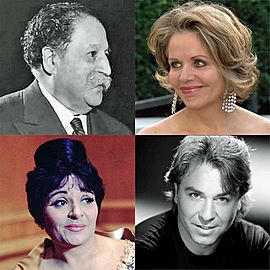
The only known recording of Massenet himself is a short part from Sapho, where he plays the piano for a singer. It was recorded in 1903 and wasn't meant to be released.
Many of Massenet's songs and opera parts were recorded in his later years and after his death. Some of these recordings featured the original singers who first performed the roles. Complete recordings of Manon and Werther from the 1930s are still available today.
His two most famous operas, Manon and Werther, have been recorded many times. Other operas like Cendrillon, Le Cid, Don Quichotte, and Thaïs also have recordings. Famous conductors and singers have performed Massenet's music on these recordings.
Besides operas, recordings of his orchestral works, like the ballet Le carillon and the piano concerto, have also been released. Many of his individual songs have been recorded, including a CD dedicated only to his songs for soprano and piano in 2012.
Reputation
By the time Massenet died in 1912, his reputation had declined, especially outside France. Some critics thought his style was too "sweet and weak" and predicted his operas would be forgotten.
However, Massenet always had supporters. For example, in the 1930s, Sir Thomas Beecham, a famous conductor, said he would trade all of Bach's Brandenburg Concertos for Massenet's Manon. By the 1950s, critics began to look at Massenet's works more positively. They noted that while he might not be a top-tier genius, his best works were very close to perfection.
By the 1990s, Massenet's reputation had greatly improved. Many now agree that while his operas might not be as grand as some others, he created a remarkable series of works for the French stage. Manon and Werther are considered masterpieces that will always be performed. Massenet's music is seen as representing many lasting parts of the Belle Époque, a very rich cultural period in history. In France, his music remained more popular, and today, there is a Massenet Festival in his hometown of Saint-Étienne to celebrate his music.
Experts agree that Manon and Werther are securely in the international opera repertoire. Several others, like Cendrillon, Thaïs, and Don Quichotte, are also becoming more popular again. While he may not be among the very greatest composers, Massenet is considered a first-class composer who created beautiful and intelligent music.
See also
 In Spanish: Jules Massenet para niños
In Spanish: Jules Massenet para niños
 | John T. Biggers |
 | Thomas Blackshear |
 | Mark Bradford |
 | Beverly Buchanan |


